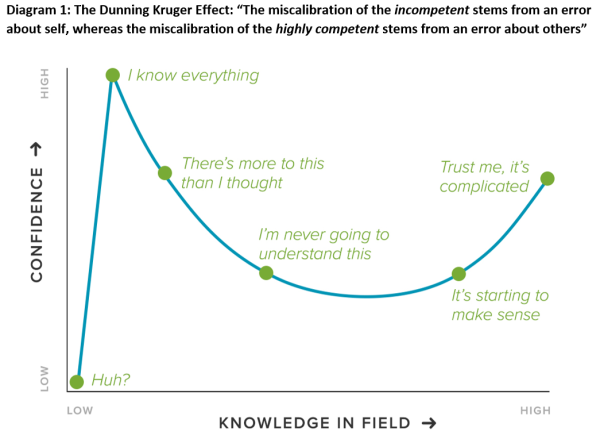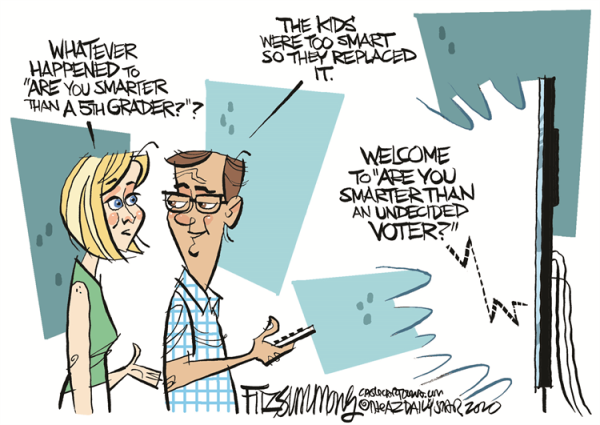I know a lot of smart people.
I also know a lot of people that think they're smarter than they are (even the smart ones ... or, perhaps, especially the smart ones).
It's common. So common, in fact, that there's a name for it. The Dunning-Kruger Effect.
Have you ever met someone who's so confident about what they think that they believe they know more than an expert in a field? That's the Dunning-Kruger effect. It's defined as a cognitive bias where a lack of self-awareness prevents someone from accurately assessing their own skills.
Here's a graph that shows the general path a person takes on their journey towards mastery of a subject.
 via NC Soy
via NC Soy
The funny thing about the above image... it's actually not a literal part of the paper on the Dunning-Kruger Effect. But it's now so commonplace that people report that chart as fact. A fitting example of the effect.
 David Fitzsimmons via Cagle Cartoons
David Fitzsimmons via Cagle Cartoons
In our daily lives, it can often be funny or frustrating to see the "victims" of this effect, but I'd warn you that we all have times where we're prone to this; and it's a sign of ignorance, not stupidity.
This is a problem with all groups and all people. Even if you already know about the cognitive bias resulting from the Dunning-Kruger Effect, you're not immune.
It should be a reminder to reflect inward - not cast aspersions outward.
Two different ways that people get it wrong, first is to think about other people and it’s not about me. The second is thinking that incompetent people are the most confident people in the room, that’s not necessarily true.
Usually, that shows up in our data, but they are usually less confident than the really competent people but not that much... - David Dunning
To close out, even this article on the Dunning-Kruger presents a simplification of its findings. The U-shape in the graph isn't seen in the paper, the connection that lack of ability precludes meta-cognitive ability on a task is intuitive, but not the only potential takeaway from the paper.
Regardless, I think it's clear we are all victims of an amalgam of different cognitive biases.
We judge ourselves situationally, and assume "the best". Meanwhile, we often assume "the worst" of others.
We can do better ... it starts with awareness.
Progress starts by telling the truth.
Getting Rid of Cognitive Biases
We make decisions all the time. To make that easier, we use shortcuts to make processing more efficient, more effective, and more certain.
At least it feels that way to us.
Mental heuristics are great - they do often save us time or effort. And, for many people, they enable better decision making. But, as with any generalization, there are exceptions that can be dangerous.
That's where cognitive biases come in; we have biases toward how we remember things, how we view ourselves, how we make decisions, and what we make things mean.
We're all victims to them, to some extent. But hopefully, by understanding them and becoming aware of them, we can limit their impact.
Here's a great infographic with 50 of the most common cognitive biases. Click to see the full-size image.
via VisualCapitalist
For a bigger infographic with 180+ cognitive biases, click here.
Posted at 07:59 PM in Business, Current Affairs, Healthy Lifestyle, Ideas, Market Commentary, Personal Development, Religion, Science, Trading | Permalink | Comments (0)
Reblog (0)